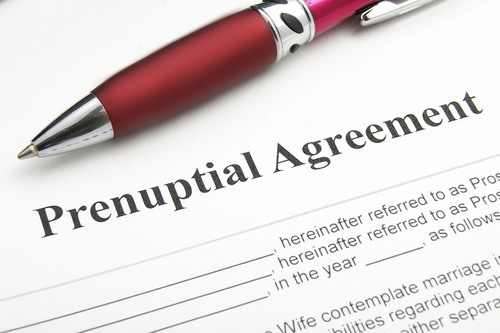Before you say, "I do," make sure you know the NC prenuptial agreement laws.
As you stand on the precipice of marriage, the excitement of a lifetime together awaits you. However, amid the whirlwind of wedding planning and dreams of a shared future, it's crucial to address the practical aspects of your union. This is where prenuptial agreements come into play.
At Doyle Divorce Law, a leading Raleigh prenuptial agreement firm specializing in family law, we understand that discussing prenuptial agreements can be a sensitive topic. Still, we believe it's an essential conversation for couples to have.
Our goal is to empower you with the knowledge and resources you need to protect your interests while nurturing a loving and lasting marriage. So, let's embark on this journey to understanding prenuptial agreements and how they can benefit both you and your partner.

What Is A Prenuptial Agreement?
A prenuptial agreement, often referred to as a "prenup" or premarital agreement, is a legally binding contract entered into by two individuals before they get married. It serves several important purposes, aiming to clarify the financial aspects and expectations of the marriage.
Financial Protection
One of the primary purposes of a premarital agreement is to safeguard the financial interests of both parties entering into a marriage. It outlines how marital assets, debts, and financial responsibilities will be managed during the marriage and in the event of divorce.
Asset Division
In the unfortunate event that the marriage ends in divorce, a well-drafted written contract can determine how financial and property rights acquired during the marriage will be divided. This can help prevent lengthy and contentious legal battles.
Debt Allocation
Prenups also address how any debts incurred during the marriage will be allocated between spouses. This is particularly important when one spouse has substantial debts before the marriage.
Spousal Support
Prenuptial agreements can establish whether or not spousal support, known as alimony, will be paid in the event of a divorce and, if so, specify the amount and duration.
Protection of Family Assets
Individuals with significant family wealth or assets may use premarital agreements to ensure that these assets remain within their family in case of divorce or separation.
What Are the Key Elements Included in a Prenuptial Agreement?
Navigating the path to a successful marriage involves more than just love and commitment– it also entails careful consideration of the financial aspects that come with it. However, many couples are unaware of the components that make up a prenuptial agreement. Let’s take a look at what to include in a prenup agreement so you can get a clearer picture of what to expect.
Full Financial Disclosure
Both parties must provide complete and accurate information about their financial situations to ensure a fair and valid prenuptial agreement. This means when you get a prenup, you must share details about income, assets, and liabilities, as well as any significant financial transactions, to avoid potential disputes based on incomplete or misleading information.
Asset Inventory
A prenuptial agreement typically requires a detailed listing of assets, including real estate, investments, bank accounts, and personal property. This comprehensive inventory helps ensure that all marital property is accounted for and provides a clear picture of the financial landscape within the marriage.
Debt Disclosure
In addition to assets, a prenup should include a comprehensive list of debts, loans, and liabilities held by each party. This disclosure helps determine how existing debts will be managed during the marriage and, crucially, how they will be allocated in the event of a divorce.
Property Division
Clear provisions for how property acquired during the marriage will be distributed in the event of divorce are a central component of any prenuptial agreement. This section outlines the process by which assets are divided, whether it be an equal split, a predetermined allocation, or a combination of both.
Spousal Support
The terms governing spousal support, if applicable, are a critical part of a prenuptial agreement. This includes specifying whether spousal support will be paid, the amount, and the duration. Such clarity can prevent contentious disputes over alimony in the future.
Legal Jurisdiction
Specification of which state's laws will govern the agreement and any disputes that may arise is an often-overlooked yet crucial element. The prenuptial contract will identify which state law is followed, ensuring that there is no ambiguity about which legal framework will be used to interpret and enforce the prenuptial agreement, enhancing its reliability and predictability.

Why Should I Get a Prenuptial Agreement?
While prenuptial agreements are often associated with financial protection, they can also serve as powerful tools for building a strong, trusting, and lasting marriage. Let’s look at why you should get a prenup agreement before the start of your marriage.
Establishing Trust
Discussing and creating a prenuptial agreement requires open and honest communication between partners. It's an opportunity to share your financial aspirations, concerns, and expectations, which can strengthen trust and transparency within your relationship.
By voluntarily sharing your financial details, you demonstrate a commitment to transparency and trust, fostering a deeper connection with your partner.
Fairness to Both Parties
Prenuptial agreements aim to achieve fairness by outlining clear terms for asset division, debt management, and spousal support. This ensures that both parties have a voice in shaping the agreement, promoting equity in your relationship.
Establishing equitable terms in advance can prevent feelings of resentment or unfairness that might otherwise arise during a divorce process.
Strengthening Communication
Creating a prenup necessitates discussions about financial matters, providing an opportunity to align your goals and expectations regarding money, spending, and saving. Through negotiations and compromise, couples can develop problem-solving and conflict-resolution skills, which are valuable tools for navigating challenges throughout their marriage.
Protecting Your Future Together
A prenuptial agreement can include provisions that protect your joint interests, such as plans for future investments, property purchases, or business ventures. It offers a platform to discuss and plan for financial matters related to children and child support or child custody matters, ensuring that their well-being remains a priority.
Reducing Stress and Uncertainty
With a prenup in place, you can reduce the stress associated with financial uncertainties during marriage and divorce, allowing you to focus on building a happy life together. In the unfortunate event of a divorce, a prenuptial agreement provides clear guidelines for asset division and support, potentially reducing the emotional toll and legal costs associated with divorce proceedings.
Respecting Family
If one or both partners come from families with substantial wealth, a prenup can safeguard these assets from being unintentionally commingled with marital property during the course of the marriage. It can ensure that any inheritances received during the marriage are retained as separate property and not subject to division in the event of a divorce. This ensures that family assets stay within the intended bloodline.

Common Myths About Prenuptial Agreements
Prenuptial agreements have long been a subject of curiosity and debate. These legally binding contracts are designed to address financial matters in the event of divorce, but they often carry with them a series of misconceptions and misunderstandings.
Our prenup lawyers are dispelling some of the most prevalent myths about prenuptial agreements and shedding light on their actual role and intent in marriages.
Myth #1: Prenups are Only for the Wealthy
One of the most pervasive myths surrounding prenuptial agreements is that they are exclusively for the rich and famous. This misconception implies that only individuals with substantial assets need to consider such agreements. In reality, prenuptial agreements are not limited to the wealthy elite.
Fact:
Prenuptial agreements are for anyone who wishes to protect their financial interests, regardless of their wealth or income level. While they can certainly shield significant assets, they also serve various other purposes, such as clarifying debt management, outlining spousal support arrangements, protecting assets one or both parties acquired from a previous marriage, and safeguarding the financial well-being of both partners.
Prenups can be tailored to address the specific needs and circumstances of each couple, making them a valuable tool for many different situations.
Myth #2: Prenups Are a Sign of Distrust in the Relationship
Another common misconception is that discussing and drafting a prenuptial agreement implies a lack of trust in one's partner. This myth suggests that considering a prenup is a harbinger of doubt about the longevity of the marriage.
Fact:
In reality, prenuptial agreements are not about mistrust but about responsible financial planning. They provide an opportunity for open and honest conversations about financial matters, expectations, and responsibilities within the marriage. These discussions can actually strengthen trust and transparency between partners.
Viewing a prenup as a practical tool for addressing financial issues can lead to a more solid foundation for the marriage, ensuring that both parties are on the same page.
Myth #3: Prenups Are One-Sided and Unfair
Many people believe that prenuptial agreements heavily favor one party over the other, leaving the less financially privileged partner at a significant disadvantage.
Fact:
While it's true that prenuptial agreements can be tailored to specific needs and preferences, they are intended to be fair and equitable. Courts scrutinize prenups to ensure that they are not unconscionable or heavily biased. Both parties are encouraged to seek independent legal counsel during the negotiation process to ensure their interests are represented fairly.
The ultimate goal of a prenuptial agreement is to establish clear, mutually agreed-upon terms for financial matters within the marriage, fostering fairness and reducing potential disputes.
How To Get A Prenuptial Agreement in NC
Obtaining a prenuptial agreement in North Carolina involves several important steps to ensure that the agreement is valid and tailored to your specific needs.
Start Early: Initiate the Conversation
The first step in getting a prenuptial agreement in North Carolina is to initiate the conversation with your partner well in advance of your wedding date. Open and honest communication is key. Discuss your motivations and expectations for the agreement, emphasizing that it's about financial planning and protecting both parties' interests.
Consult with an Experienced Family Law Attorney
Seeking legal counsel is crucial when pursuing a prenuptial agreement. Find an experienced family law attorney in North Carolina who specializes in prenuptial agreements. They will guide you through the process, ensure your rights and interests are protected, and help you create a legally sound agreement.
Provide Full Financial Disclosure
Both you and your partner must provide complete and accurate information about your financial situations. This includes sharing details about income, assets, debts, and any significant financial transactions. Full transparency is essential to create a fair and enforceable agreement.
Negotiate Terms and Provisions
With the guidance of your respective attorneys, engage in negotiations to determine the terms and provisions of the prenuptial agreement. This may include asset division, spousal support, debt management, and other financial matters. Be prepared to compromise and reach mutually agreeable terms.
Draft the Agreement
Your attorneys will draft the prenuptial agreement based on the terms negotiated. The document should be clear, comprehensive, and in compliance with North Carolina law. It must also be fair to both parties and free from any elements that could render it invalid, such as duress or lack of full disclosure.

Secure Independent Legal Representation
Each party should have their own lawyer to review the agreement. This ensures that both parties fully understand the terms and that the agreement is fair and equitable. It also helps protect the enforceability of the agreement in court.
Sign the Agreement
Both parties must sign the prenuptial agreement willingly and without pressure. The agreement should be executed well before the wedding, ideally several weeks or even months in advance, to demonstrate that it was not signed under duress or last-minute coercion.
In North Carolina, it's advisable to have the prenuptial agreement notarized and witnessed by at least one impartial individual to further strengthen its validity.
Ensure Proper Filing and Safekeeping
While prenuptial agreements in North Carolina do not have to be filed with the court, it's essential to keep the original document in a secure location, such as a safe or a safety deposit box. Make copies for both parties and their respective attorneys.
Undergo Periodic Review (Optional)
Consider revisiting the prenuptial agreement periodically, especially if there are significant changes in your financial circumstances or if you experience major life events, such as the birth of children or the acquisition of substantial assets.
How is a Prenup Different from a Post-Nuptial Agreement?
Prenuptial agreements and post-nuptial agreements are distinct legal instruments that serve similar purposes but differ significantly in terms of when they are created and their specific content. Here, we'll outline the key differences between these two types of agreements.
Timing
Prenuptial agreements are established and signed before a marriage takes place, whereas postnuptial agreements, as their name suggests, are created and signed after the marriage has occurred. Couples typically turn to postnups at some point during their marriage, rather than before it. They are a tool for addressing financial matters that may have arisen after the wedding, providing an opportunity to adapt to changing circumstances.
Purpose
A prenup is designed to outline how financial aspects will be managed both during the marriage and, critically, in the event of divorce or separation. A postnuptial agreement serves many of the same purposes as prenups, such as clarifying financial matters and protecting both parties' interests. However, they can also address issues that have arisen during the marriage, such as changes in financial circumstances or a desire to redefine financial responsibilities, making them adaptable tools for addressing evolving financial needs.
Content
Prenuptial agreements cover various financial issues, including the division of assets, allocation of debts, provisions for alimony, and the safeguarding of family assets or legacies. The content of a post-nuptial agreement can vary widely. It may address changes in asset ownership, the division of new assets acquired during the marriage, modifications to spousal support arrangements, or the inclusion of terms not initially addressed in the prenuptial agreement.
Postnups provide a flexible means of adjusting financial agreements to reflect the changing circumstances within a marriage.
Contact a Raleigh Prenuptial Agreement Lawyer Today
Embarking on the journey of creating a prenuptial agreement in North Carolina is a significant step toward ensuring financial transparency, protection, and harmony in your marriage. To navigate this process successfully and create an agreement that meets your unique needs, it's essential to seek the guidance of an experienced Raleigh family law attorney.
Contact our knowledgeable legal team at Doyle Divorce Law today. Our skilled attorneys are dedicated to helping you create a prenuptial agreement that reflects your priorities and values while adhering to North Carolina law. Reach out to us now for a consultation and begin the journey towards a stronger, more secure future together.
Get started today by calling us at (919) 301-8843 or filling out the contact form below.



